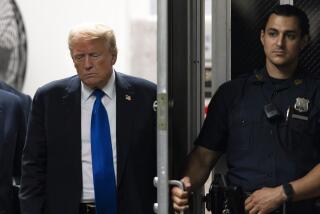Is Michael Cohen a whistleblower or a huckster or both? We still don’t know

Michael Cohen, who worked as President Trump’s personal lawyer and New York fixer for more than a decade, suggested that Trump had skirted or violated federal banking, tax and campaign finance laws.
- Share via
Call it the battle of the Trump narratives. When Michael Cohen testified to a key House oversight committee Wednesday about his years working for Donald Trump, Democrats and Republicans on the panel were determined to advance very different story lines for the public.
The Democrats on the House Oversight and Reform Committee wanted Cohen to be the insider-turned-whistleblower who could deliver hard evidence of criminal activity by President Trump and possibly collusion between him or his presidential campaign and Russia.
The Republicans, meanwhile, wanted the public to see Cohen as an unprincipled disgruntled employee, a “pathological liar” and a greedy tax evader with an ongoing list of criminal offenses. They went after Cohen’s credibility — and there was much to attack — and the committee’s credibility with hammer and tongs from the beginning of the hearing, determined to defend Trump.
Cohen, meanwhile, was pushing his own story line: he was a once-loyal fixer who did shameful things in service of a charismatic figure. In other words, he was a good man led astray, and now he was seeking (as he said multiple times) redemption.
The hearing is continuing, but so far none of them has been particularly successful.
Democrats sought damning testimony on multiple issues connected to Trump — collusion with Russia, alleged bank fraud, lying to reporters and others — but produced little that the public hadn’t already heard, or that didn’t elaborate on allegations already made against the president. Worse for Democrats, they often went fishing for things Cohen couldn’t supply, particularly on Russia.
Some of the most damaging assertions that Democrats drew out of Cohen concerned financial crimes that Trump allegedly committed before he became president. Still, what Cohen provided was mainly leads and suggestions, not hard proof.
Cohen did call Trump several things we had not heard him call Trump before, including a racist and a con man. But even there, he was hardly the first person to say such things.
For Republicans, the hammering at Cohen and the committee only fed the impression that their top priority is protecting Trump, regardless of anything the president may have done. It wasn’t until the hearing was well into its fourth hour that a Republican engaged at any length with Cohen over the allegations he had made.
Cohen actually issued a veiled warning at one point, suggesting that Republicans who continued to blindly defend the president would end up like he did. He also had moments of impressive candor, as when he admitted that he would be pursuing a book deal. And to his credit, he seemed more defeated than combative; he said he was ashamed of what he’d done, and that came through in his tone and his body language.
Yet the hearing didn’t exactly buff Cohen’s tarnished image. The committee’s Republicans made sure of that, pointing out over and over again the financial crimes Cohen admitted to committing that had no connection at all to Trump.
If the hearing was supposed to lay a foundation for impeaching the president, as some Republicans on the panel alleged, it didn’t get very far. Cohen has credibility problems that his performance Wednesday could not erase. And even if you believed every word of his testimony, it added up to more smoke about the president than fire.
Enter the Fray: First takes on the news of the minute »
UPDATES:
1:55 p.m.: This post was updated with additional details from the hearing.
More to Read
A cure for the common opinion
Get thought-provoking perspectives with our weekly newsletter.
You may occasionally receive promotional content from the Los Angeles Times.










